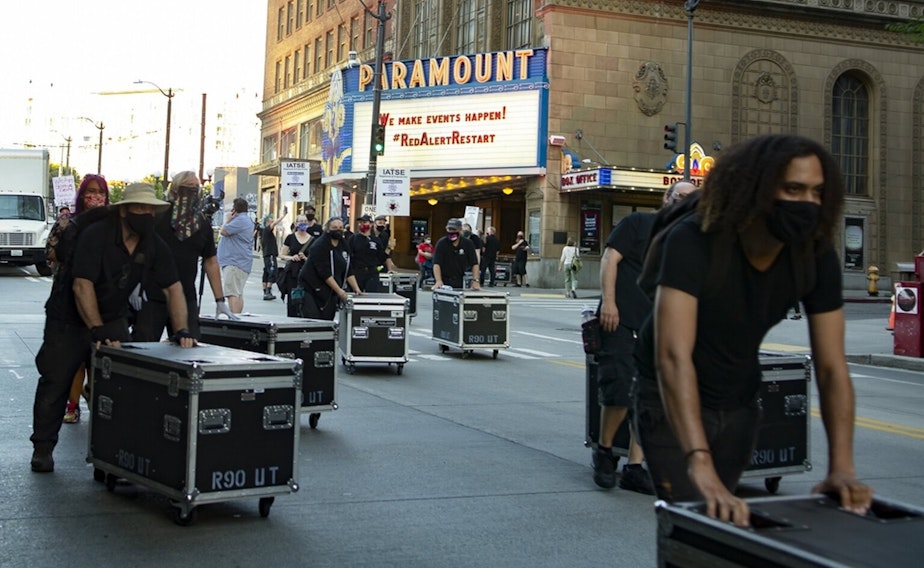When theatres went dark, stagehands worked to keep their unique community protected

Theatres and other performance spaces around Seattle have been shuttered for over a year now. Many of us miss the magic of attending a live performance, but how often do we think about the people behind the scenes?
Crystal Paul is a features reporter at the Seattle Times. She wrote recently about how the loss of work has affected the community of stagehands in Seattle. She told KUOW’s Kim Malcolm what she found.
This interview has been edited for clarity.
Kim Malcolm: Remind us of what it was like when the performing arts spaces shut down back in March of 2020.
Crystal Paul: In other industries, it was pretty slow. There were some options for people. There was takeout for restaurants. People were kind of trying to navigate some things. For theater techs, it was literally one day they were hard at work, and the next that’s it, that’s a wrap. They turned off the lights and walked out. They set down their tools, and that was it.
What kind of impacts did they start feeling from that?
The theater tech community is different than other communities in that they're really tight-knit. They spend 16 hours a day, five days a week, or maybe even seven days a week during production or tech, just with each other, waiting for single lighting cues, cramped in the very small spaces backstage, and they get to know each other really well. It's sort of like a family.
Sponsored
Suddenly, here they were, no money, not seeing the people that they're used to seeing every day, and no real way to continue doing their work. They were hit pretty hard.
And because they were close-knit, some people started to understand that this was happening. Some leaders in the community, these union folks, what were they trying to do to try to reach out and help each other?
The order came down from the international stagehand union to hurry up and get resources for people. One of those resources was a buddy system. I was really impressed by the buddy system that they described at our local union here. They basically got together a list of people who they felt might be most at risk for various reasons, and they made sure that someone in the union was checking in on them once a week via text or phone call, stopping by their house at a social distance, and if they saw any of the warning signs.
I understand one of the things they were looking for was if a stagehand started giving away their tools. What would be so significant about that?
For a stagehand, their tools are what they absolutely need to do the job, in order to make the magic happen on stage. Everything that you see happening on stage that looks seamless and magical, that's the work that theater techs are doing backstage.
Sponsored
When a theater tech gives away their tools, it's like they're giving away the thing that enables them to do the work that they love, and it is work that they love because it is a community, a family. It is something that they feel passionate about, making these magical moments for people. Every time you let out an 'ooh' or an 'aah' because you've seen something on stage, there's someone backstage who worked really, really hard to make that happen. They live for those moments.
You write quite poignantly about the life of a stagehand, the highs and the lows of it, the camaraderie among them. Can you tell us about some of the people who you met whose stories really stood out for you?
There is a stagehand who retired recently from the Pacific Northwest Ballet, Howard Nelson. He's 70 years old now. He talks about his time as a stagehand as if it were the highlight of his life. He was able to travel all over the world.
He talks about this one instance where he went overseas for production and he knew nothing about this place. He met other stagehands there, and they immediately welcomed him into the community and took them to their favorite watering holes. He got to see the city through the eyes of a local at the ground level, versus the sort of tourist experience.
I think that really encapsulates how the work is what unites these people. They are a community even if they don't spend 16 hours a day together with each other. They support each other no matter what in this way that really makes it a family.
Sponsored
Listen to the interview by clicking the play button above.
If you are experiencing suicidal thoughts or have concerns about someone else who may be, call the National Suicide Prevention Lifeline at 1-800-273-TALK. That's 1-800-273-8255.





